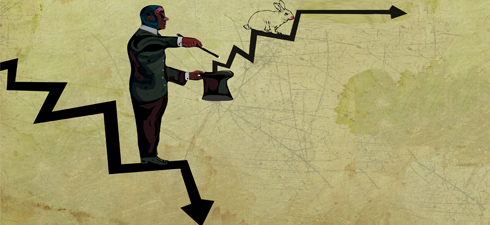If you were to change the names of the countries to names of characters with a more southern ring, current developments in the eurozone would seem like a quality soap opera, full of lies, love, cheating and plot twists. And like with any good soap opera, the scenario here could be written on the back on an envelope.
In Spain there are as many empty houses as in the United States, which is six times the size of Spain. The prices are falling slowly and will keep falling for some time to come. Spanish banks, which financed the construction of ghost towns with cheap euros, pretended at first that everything was fine. The Spanish and European politicians put on the same reassuring faces.
The hundred billion euros loan to Spain is going to be used to recapitalise the financial system, which is why the Spaniards were not being forced to sign any memorandum as tough as the one set down before the Greeks. And here the plot got tangled.
The Syriza party in Greece has begun to shout even louder: why should Greeks, they are asking, have to fulfil some conditions when the Spaniards do not? The Irish, silent and obedient till now, are joining in. Why should they pay for the housing bubble with their hard-earned savings? Even tiny Cyprus, which is also going to need spending money, is tentatively raising its hand in the euro hacienda.
The main character lurks in the background
Is that all? Not even close. We’re only at the 44th episode (that’s how many declarations the Eurogroup has issued on the stability of the euro since the Greek crisis broke out). Portugal has run through almost three quarters of its bailout funds, and access to the bond markets is still nowhere in sight.
Spain’s problems don’t end with the banks: its public finances are in an unenviable state thanks to regions that are going bankrupt and to the highest unemployment in the European Union, and if interest on the debt goes over the magical figure of seven per cent, around which it has been oscillating, they will immediately hold out both hands for more money. The Finns are threatening that without guarantees it will not lend a penny to anyone.
Indeed, though, it makes little difference: everyone is waiting for the moment when the main character of the entire series shows up, the character that so far has been treading quietly in the background – Italy.
Once upon a time
And what about Slovakia? The country is preparing to introduce or increase fourteen new or higher taxes and levies to bring in an additional one billion euros in order to guarantee Spain the same amount – one billion euros. The Finance Minister, however, denied that on Friday, labelling suspicions that the money was for Spain ‘badmouthing’ by hostile media and some politicians. Slovakia might be able to contribute a storyboard to the soap opera. It would probably go like this —
Once upon a time, in 1999, a small country in Central Europe had a banking system in trouble. Heads got together and came up with a recovery plan, which cost 125 billion crowns (or ten percent of its GDP at the time). The residents of that country paid it, even though it was a substantial sum that cost each family about one hundred thousand crowns, which was then the average annual net income per person.
If we were to divide the current one hundred billion euros among the Spaniards, it would cost each family six thousand euros, or less than three months’ net income of the average Spaniard. But in Europe, you see, we must help each other out. Perhaps one day the Spaniards will repay us by giving us some hacienda on the Costa del Sol.
Was this article useful? If so we are delighted!
It is freely available because we believe that the right to free and independent information is essential for democracy. But this right is not guaranteed forever, and independence comes at a cost. We need your support in order to continue publishing independent, multilingual news for all Europeans.
Discover our subscription offers and their exclusive benefits and become a member of our community now!












